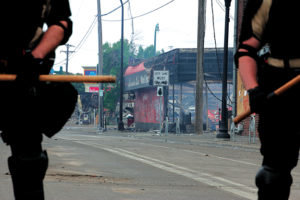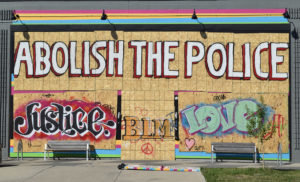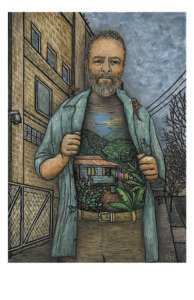 Smoke billows from E. Lake St. and Minnehaha the morning after a night of fire. (Photo by Tesha M. Christensen)
Smoke billows from E. Lake St. and Minnehaha the morning after a night of fire. (Photo by Tesha M. Christensen)Editor’s note: In an effort to support a conversation about a current initiative in Minneapolis, I talked to three local activists and Longfellow business owners about defunding the police for this article. There are also suggested resources within the article for learning more. We welcome signed letters to the editor talking about the pros and cons as you see them, as we know there are lot of opinions about this initiative and one article can only include pieces of the larger conversation. We will continue to cover this issue as it unfolds. Email news@LongfellowNokomisMessenger.com.
You can’t miss the sign at Moon Palace Books, three buildings down from the Third Precinct at 3032 Minnehaha Ave.
 Moon Palace Books owners Jamie and Angela Schwesnedl support a change to the police and prison system in favor of one that is "actually designed to keep the people in our communities safe." (Photo by Jill Boogren)
Moon Palace Books owners Jamie and Angela Schwesnedl support a change to the police and prison system in favor of one that is "actually designed to keep the people in our communities safe." (Photo by Jill Boogren)ABOLISH THE POLICE
Before nine Minneapolis City Council members announced their intent to defund the police; before the National Guard was called to quell an uprising the size of which had never before been seen in Minneapolis; before 31 buildings in the neighborhood were burned and many more damaged; before countless peaceful protesters and journalists were injured – Moon Palace books had taken a stand.
Owners Jamie and Angela Schwesnedl have been active with and supportive of different organizations and campaigns for prison and police abolition for over 25 years.
“Many communities in our society have been prevented from functioning and thriving because of the police, and the institutions of white supremacy and predatory capitalism that the police protect and enforce,” the couple pointed out. “We absolutely need to figure out ways to keep all of our neighbors and communities safe. The Minneapolis Police Department was not created or designed to keep everyone safe, and it hasn’t functioned to do that.”
They support defunding and disbanding the police.
“Police forces in America have always served as slave-catchers for the Prison-Industrial system, which is a direct continuation of the brutal institution of antebellum slavery,” explained the Schwesnedls. “American police have grown increasingly more militarized, and use larger and larger amounts of city, county and state budgets, and have always functioned to terrorize communities of color, and enforce social control to protect the interests of the owning class, at the expense of workers’ rights.
“Instead of the lie that police exist to keep us all safe, we want systems that are actually designed to keep the people in our communities safe. We want systems and institutions that value ALL human life, including the lives of Black people, Indigenous people, trans people, women, people of color, etc.”
They added, “We feel terrible for everyone who lost businesses that represent countless hours and years of their labor and passion. And none of our businesses are as important as human lives that have been lost to police violence. Lives of Black people, Indigenous people, people of color. None of our businesses are as important as putting an end to the trauma and suffering that police violence and intimidation has wrought on so many of our neighbors for so many years.”
As white, Euro-Americans, the Schwesnedls are currently working to amplify the voices of the groups and people leading the struggle on the ground, as well as providing some financial support, and making phone calls, sending emails, attending rallies, protests and meetings when they are able.
To learn more, they encourage people to check out groups like MPD150, Reclaim the Block, and Black Visions Collective.
 Ricardo Levins Morales has been involved with MPD150 for years, and encourages people to go there for thoughtful answers and information on disbanding the police. (Art submitted)
Ricardo Levins Morales has been involved with MPD150 for years, and encourages people to go there for thoughtful answers and information on disbanding the police. (Art submitted)Artist and activist
As an artist and an activist, Ricardo Levins Morales (3260 Minnehaha) has been involved with MPD150 for years.
In 1967 at 11 years old, Morales and his family left Puerto Rico and landed in Chicago during a time of great turmoil and police brutality. It was safer for him to walk the alleyways and take his chances with the gangs than to be on the streets and deal with the police, he recalled. “It was clear the police were dangerous people to be around,” said Morales.
One day the police shot a Black teen who was running home to catch a television show. “They said if he was running, he must have been running from a crime,” said Morales.
By age 14 or 15, Morales had started his life of activism and art when he discovered print making and screen printing. He’s been involved in labor organizing, farmers’ movements, peace activism, ecological work, international solidarity and more. “To me, they are really all the same thing: supporting human resilience in the face of hardship,” he explained.
He opened a studio at Minnehaha and 38th in 2009, and moved to his current location next to Peace Coffee two and a half years ago. Right now, Morales is giving away buttons to protesters that state: “Abolish the police, reform is not enough.”
As a Latinex man, Morales believes in the importance of solidarity with others who have had bad experiences with the police. This stands in contrast to the white racist narrative that believes if the cops are doing something bad to you then you must have deserved it, he pointed out.
What struck him about George Floyd’s murder was the “absolute indifference of this killer cop.” He said, “The police are essentially fulfilling the role lynch mobs did.”
Too broken to fix, only solution is replacement
Three years ago, on the 150th anniversary of the Minneapolis Police Department, MPD150 released a report detailing brutal practices baked into the formation of the department and tracking them through the years.
“We broke down how they interact everyday with people in crisis. They don’t do anything well,” said Morales. “You need grown-ups, not people who show up with tear gas and tasers and shoot at people. It’s all based on the mythology of how they supposedly keep us safe.”
Morales stated, “Having more cops in a city doesn’t make crime go down.” He pointed to white suburbs that have less police and policy brutality and less crime.
“People want decent homes, green spaces, parks for children. These are the basics of life that white suburbanites take for granted,” said Morales. When people have what they need, crime goes down. He supports using the millions spent on police in other ways to help people get their needs met, and implementing common sense solutions. Top on that list is stable housing.
Reforms instituted over decades haven’t work to fix police departments, said Morales.
On July 22, 2006, 19-year-old Fong Lee was shot eight times and killed by St. Paul Police Officer Jason Andersen. The gun authorities said they found nearby his body came from the police evidence room, Morales pointed out. “The officer was let off the hook.”
More training, review commissions, residency requirements – these simply do not work, said Morales. “It’s one of those entities so riddled with corruption, the only solution is replacement.”
He added, “There are a lot of people with solutions to problems that don’t involve killing them.”
If the mission is to help people, then the solution is to figure out what people need on a case-by-case basis and send those specific resources, such as mental health service providers, social workers, people trained in trauma and deescalation, victim/survivor advocates, religious leaders, and block clubs.
He encourages people to listen to what people of color are saying they need, and to read the thoughtfulness that has already gone into answering these questions by groups such as MPD150, Reclaim the Block and Black Visions Collective.
“Police have played a major role in making sure people without any money don’t have a chance,” said Morales, but he sees hope in what’s happening today and in people doing the work now that should have been done long ago.
“We’re living in different times but no more different than the other times,” he said. “The only difference is people are demanding better.”
Comments
No comments on this item Please log in to comment by clicking here